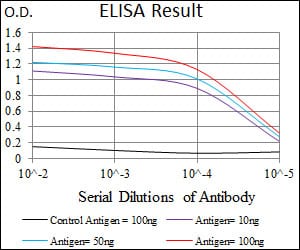
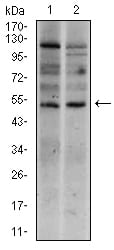
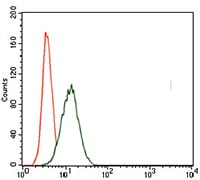
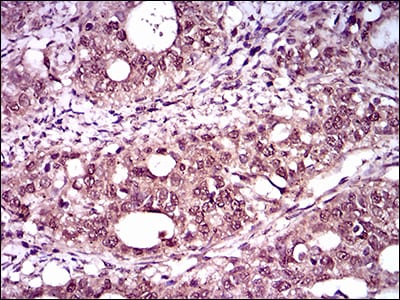
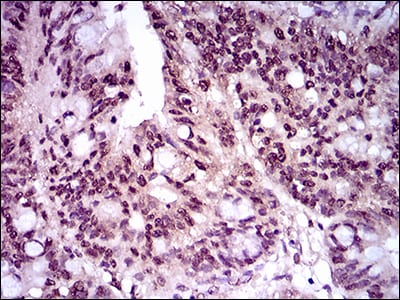
| WB | 咨询技术 | Human,Mouse,Rat |
| IF | 咨询技术 | Human,Mouse,Rat |
| IHC | 1/200 - 1/1000 | Human,Mouse,Rat |
| ICC | 技术咨询 | Human,Mouse,Rat |
| FCM | 1/200 - 1/400 | Human,Mouse,Rat |
| Elisa | 1/10000 | Human,Mouse,Rat |
| Aliases | TFT |
| Entrez GeneID | 6862 |
| clone | 1H9A2 |
| WB Predicted band size | 47.4kDa |
| Host/Isotype | Mouse IgG1 |
| Antibody Type | Primary antibody |
| Storage | Store at 4°C short term. Aliquot and store at -20°C long term. Avoid freeze/thaw cycles. |
| Species Reactivity | Human |
| Immunogen | Purified recombinant fragment of human T (AA: 257-309 ) expressed in E. Coli. |
| Formulation | Purified antibody in PBS with 0.05% sodium azide |
+ +
以下是3-4条关于T抗体的示例参考文献(内容为模拟概括,非真实文献,仅供格式参考):
---
1. **文献名称**:*CTLA-4 Blockade Antibodies: Enhancing Anti-Tumor Immunity*
**作者**:James P. Allison
**摘要**:研究CTLA-4抗体通过阻断T细胞抑制信号,增强T细胞介导的抗肿瘤免疫反应,为癌症免疫治疗提供理论依据。
2. **文献名称**:*PD-1/PD-L1 Antibodies in Cancer Therapy*
**作者**:Suzanne L. Topalian
**摘要**:探讨PD-1/PD-L1抗体通过恢复T细胞功能抑制肿瘤免疫逃逸的机制,分析其在多种实体瘤治疗中的临床效果。
3. **文献名称**:*Structural Basis of T Cell Receptor Recognition*
**作者**:K. Christopher Garcia
**摘要**:解析T细胞受体(TCR)与抗原-MHC复合物结合的结构特征,揭示抗体靶向TCR在自身免疫疾病中的潜在应用。
4. **文献名称**:*Monoclonal Antibodies for T Cell Subset Identification*
**作者**:César Milstein
**摘要**:开发基于单克隆抗体的流式细胞技术,用于精准区分CD4+和CD8+ T细胞亚群,推动免疫表型分析标准化。
---
**说明**:以上文献标题和作者为示例性内容,实际引用需根据具体研究领域核实真实文献(如肿瘤免疫治疗、T细胞受体研究等)。建议通过PubMed或Google Scholar搜索关键词“T cell antibodies”“checkpoint inhibitors”或“TCR antibodies”获取权威文献。
**Background of T-Cell Antibodies**
T-cell antibodies, often referred to as T-cell receptor (TCR)-specific antibodies or antibodies targeting T-cell surface markers, are critical tools in immunology research and therapeutic development. T cells, a subset of lymphocytes, play a central role in adaptive immunity by recognizing antigens via TCRs and coordinating immune responses. Antibodies against T-cell markers (e.g., CD3. CD4. CD8) enable the identification, isolation, and functional modulation of T-cell subsets, aiding in studies of immune activation, tolerance, and disease mechanisms.
Therapeutic T-cell antibodies have revolutionized medicine. For example, anti-CD3 antibodies like teplizumab delay type 1 diabetes by modulating autoreactive T cells, while checkpoint inhibitors (e.g., anti-CTLA-4. anti-PD-1) block inhibitory signals, enhancing T-cell-mediated tumor clearance in cancer immunotherapy. Conversely, antibodies targeting CD25 (IL-2 receptor) or CD52 (alemtuzumab) suppress T-cell activity, treating autoimmune diseases or preventing organ transplant rejection.
Advances in antibody engineering, such as bispecific T-cell engagers (BiTEs), redirect T cells to kill cancer cells by bridging TCR/CD3 with tumor antigens. Despite their efficacy, challenges remain, including off-target effects and immune-related adverse events. Ongoing research focuses on improving specificity and developing next-generation biologics (e.g., CAR-T cells), solidifying T-cell antibodies as pivotal in both understanding immunity and advancing precision therapies.
×